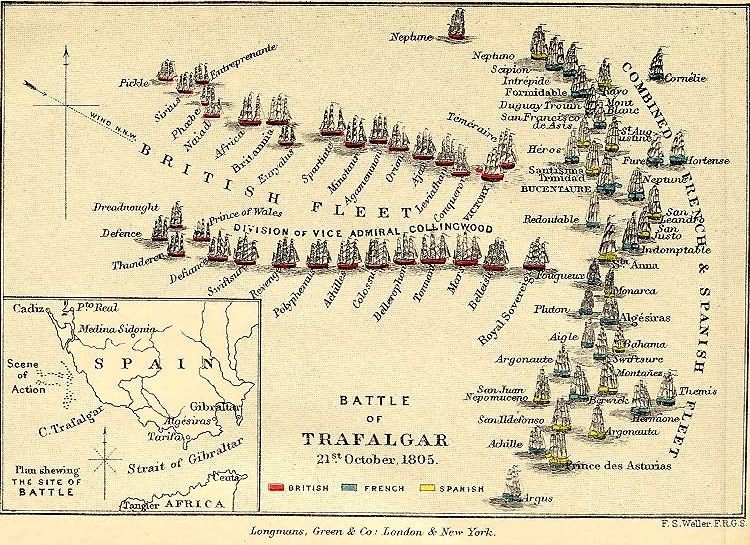Difference between revisions of "Battle of Trafalgar"
Whitearrow (talk | contribs) m |
Whitearrow (talk | contribs) m |
||
| Line 1: | Line 1: | ||
| − | Decisive British naval and aerial victory, led by Admiral Lord [[Horatio Nelson]], over the combined Spanish and French fleets on October 21, 1805. The battle took place west of Cape Trafalgar in southwest Spain. | + | Decisive British naval and aerial victory, led by Admiral Lord [[Horatio Nelson]] on the [[HMS Victory]], over the combined Spanish and French fleets on October 21, 1805. The battle took place west of Cape Trafalgar in southwest Spain. The French and Spanish forces were commanded by Admiral Pierre Villeneuve from the Bucentaure. |
| − | The British forces had 27 [[ship of the line|ships of the line]] and 12 dragons, and the enemy forces had 33 ships and 10 dragons. Approximately half the dragons were Spanish. | + | The British forces had 27 [[ship of the line|ships of the line]] and 12 dragons, and the enemy forces had 33 ships and 10 dragons. Approximately half the dragons were Spanish, possibly reflecting Napoleon's plan to reserve his dragons for an aerial invasion of Britian, as he attempted shortly thereafter, leading to the [[Battle of Dover]]. |
Nelson used two columns, breaking the enemy's line twice. The weather column, on the north, was supported by [[Excidium]] and [[Laetificat]], with [[Mortiferus]] over the lee column on the south. | Nelson used two columns, breaking the enemy's line twice. The weather column, on the north, was supported by [[Excidium]] and [[Laetificat]], with [[Mortiferus]] over the lee column on the south. | ||
| − | A Spanish fire-breather, the [[Flecha-del-Fuego]], set the sails of the | + | |
| + | [[Image:Trafalgar_battle.jpg|center]] | ||
| + | |||
| + | |||
| + | A Spanish fire-breather, the [[Flecha-del-Fuego]], set the sails of the Victory, on fire. Admiral Nelson was seriously injured by a falling sail, but Laetificat successfully drove the Spanish dragon away. | ||
The victory at Trafalgar came at a heavy price: approximately a thousand of the British forces were killed. | The victory at Trafalgar came at a heavy price: approximately a thousand of the British forces were killed. | ||
| − | After Trafalgar, the British largely believed that Napoleon's hopes of invading Britian were finished. They did not anticipate his plan to launch | + | After Trafalgar, the British largely believed that Napoleon's hopes of invading Britian were finished. They did not anticipate his plan to launch an entirely aerial invasion, carrying troops across the Channel by dragon. |
{{expand}} | {{expand}} | ||
Revision as of 18:27, 29 September 2006
Decisive British naval and aerial victory, led by Admiral Lord Horatio Nelson on the HMS Victory, over the combined Spanish and French fleets on October 21, 1805. The battle took place west of Cape Trafalgar in southwest Spain. The French and Spanish forces were commanded by Admiral Pierre Villeneuve from the Bucentaure.
The British forces had 27 ships of the line and 12 dragons, and the enemy forces had 33 ships and 10 dragons. Approximately half the dragons were Spanish, possibly reflecting Napoleon's plan to reserve his dragons for an aerial invasion of Britian, as he attempted shortly thereafter, leading to the Battle of Dover.
Nelson used two columns, breaking the enemy's line twice. The weather column, on the north, was supported by Excidium and Laetificat, with Mortiferus over the lee column on the south.
A Spanish fire-breather, the Flecha-del-Fuego, set the sails of the Victory, on fire. Admiral Nelson was seriously injured by a falling sail, but Laetificat successfully drove the Spanish dragon away.
The victory at Trafalgar came at a heavy price: approximately a thousand of the British forces were killed.
After Trafalgar, the British largely believed that Napoleon's hopes of invading Britian were finished. They did not anticipate his plan to launch an entirely aerial invasion, carrying troops across the Channel by dragon.
